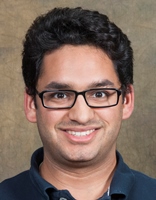
A Wayne State University School of Medicine first-year medical student is one of only 53 students nationwide selected for a prestigious fellowship to conduct medical research in the lab of a mentor this summer.
Ankush Chandra, of the Class of 2019, received the 2016 Carolyn L. Kuckein Student Research Fellowship from the Alpha Omega Alpha Honor Medical Society.
The fellowship provides Chandra $5,000 to conduct research during the summer and $1,000 for travel to present the results at a national or international meeting. Chandra will conduct his research in the laboratory of Manish Kumar Aghi, Ph.D., M.D., professor of Neurosurgery for the University of California San Francisco. Dr. Aghi specializes in adult brain tumors. As principal investigator at the UCSF Brain Tumor Research Center, his research interests include glioblastoma angiogenesis, mechanisms of glioblastoma resistance to anti-angiogenic therapy, and experimental glioblastoma therapies like oncolytic viruses.
"While I am still uncertain about the field of medicine I would like to practice, I am driven toward procedure-based fields," said Chandra, who was born in New York. "I have had a long-term interest in the neurosciences, and thus I am exploring neurology, neurosurgery, neuro-oncology, neuro-radiation oncology and interventional neurology."
His research project is titled "Characterization of Binding Sites Implicated in Cross Activation of c-Met/B1 Integrin in Bevacizumab-Resistant Glioblastoma." Glioblastomas are often considered the most malignant of brain tumors.
"Glioblastoma is a model disease that stimulates my interest. What really interests me about this tumor is its intricacies of this tumor," he said. "This tumor has a well-orchestrated mechanism of invasion that lets it become intimately imbedded into the normal neural tissue. This makes it difficult to treat and surgically remove. … This tumor becomes resistance to therapy and develops an even more aggressive and invasive phenotype."
Data from the lab he will be joining has identified molecules that are unregulated and cross link to provide resistance in glioblastoma to treatment with bevacizumab, a drug that slows the growth of new blood vessels and is used to treat certain cancers. He is interested in investigating specific sites of the two molecules that could lead to development of small molecule inhibitors to overcome the resistance.
Chandra has prior experience in cancer and neuroscience research. As an undergraduate at Boston University, he conducted research in the laboratory of Hengye Man, M.D., Ph.D., associate professor of Biology, and completed a senior thesis that investigated the role of clathrin-mediated endocytosis in neuronal development. After graduating, he conducted two years of full-time research in the Eichler Lab at Harvard Medical School/Massachusetts General Hospital, investigating molecular mechanisms underlying white matter leukodystrophies. His research was published in the October 2015 edition of the Journal of Neuroscience. During the thesis year of his master's degree at Boston University Chandra worked for Merrimack Pharmaceuticals, testing biologics that targeted specific tumor or tumor cells expressing a specific biomarker.
"This research work really developed and shaped my interest in research targeted therapies for different types of cancers, especially hard-to-treat cancers such as glioblastoma," he said. "While we know so much about the brain, there's much more we don't know. The brain is a very mysterious organ that behaves uniquely."
Chandra credits his mother's diagnosis with cancer when he was in ninth grade as the "initial spark" to pursue research and medicine. She has since been in full remission and cancer free since 2005.
"While we have discovered and developed many advanced therapies for cancer, millions of people still die from this disease each year. It has been commonly found across all cancers that tumors tend to become resistant to chemotherapy and become invasive," he said. "This field is very exciting as we are able to use molecular biology approaches to understand the mechanism of resistance and target specific sites to overcome the resistance. Such therapies have proven to be more effective as adjuvant therapy alongside chemotherapy than chemotherapy alone."